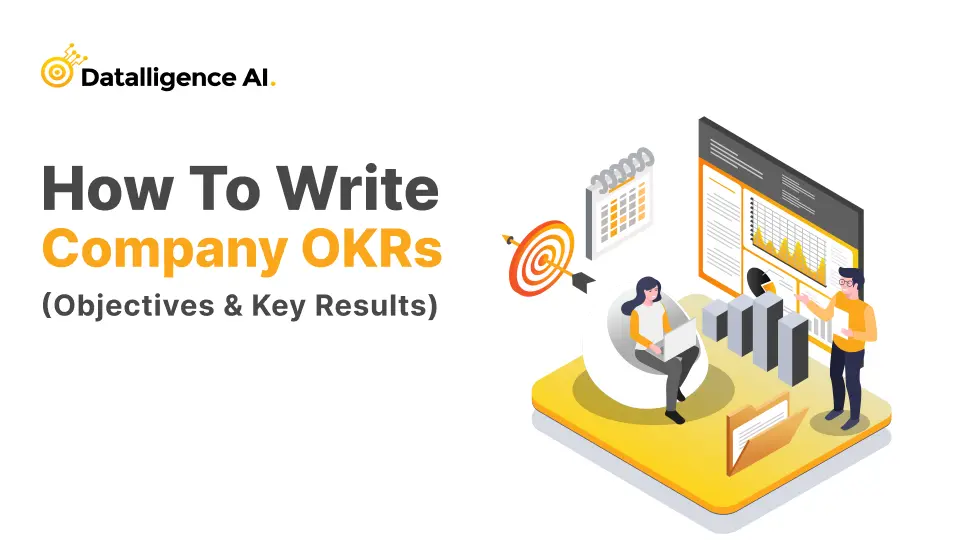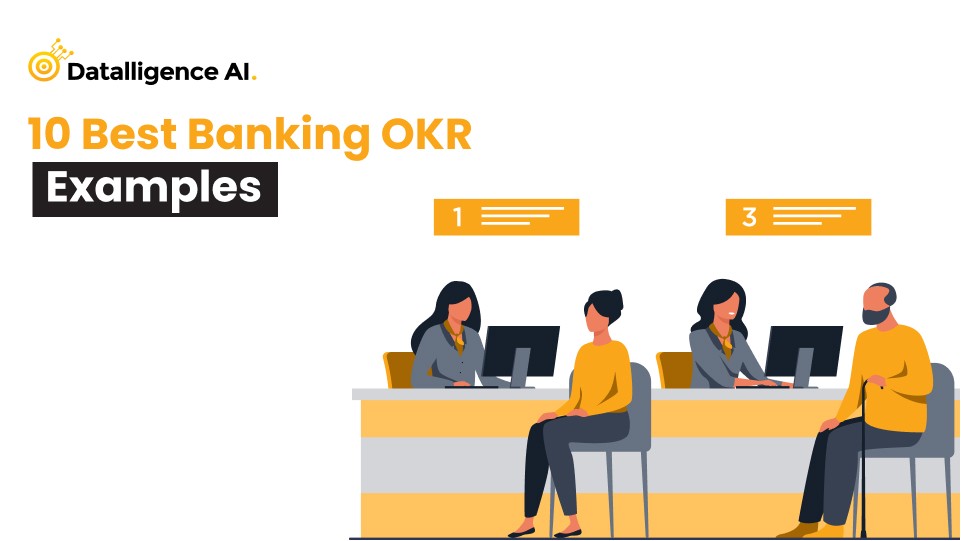Introduction
Objectives and Key Results (OKRs) are an organization’s goal-setting platform to track strategy execution. Once the strategy is set for a specific period you can measure how the progress is and measure the execution accordingly. Defining the goals and strategy is the most valuable time an organization spends. They set measurable metrics to evaluate how the organization is performing.
To be more specific
Objective – what are we trying to accomplish
Key Results – How are you going to achieve this?
OKRs provide a clear direction and guide the teams to progress on what matters to the business. These OKRs are aspirational and audacious in nature which drives organizations to reach the next level in each period.
An Objective is mostly a statement that communicates what you want to achieve and is time bound
A Key Result is a quantifiable or measurable metric that measures the progress of an objective and helps you understand the speed at which it is traveling and whether is on track or off track.
Why should you write OKRs for your company
To put it simply Company OKRs are the North star of an organization. It guides the team to create their team and individual objectives. This creates focus among the team to indicate where they should travel.
It is important that the organization starts with the company OKRs which will in turn promote top-down or bottom-up alignment. As objectives are very specific and timebound it helps the team to create OKRs and focus accordingly.
Benefits of having OKR (Objectives & Key Results) in your organization
As OKR framework is a well-proven frame used by organizations like Google, Uber, LinkedIn, and other established organization. The results were exponential. Organizations using OKRs had a minimum of 10x growth.
The benefits are immense. Let us discuss a few to understand the value OKRs bring to an organization.
Focus
OKR framework increases focus as the Objective count is less than 5. Less is more. Keeping fewer objectives increases focus and helps in prioritizing the goals. It helps the team to maintain focus and plan activities accordingly. This kills procrastination and increases focus
Alignment
OKRs’ very important benefit is increasing alignment and eliminating silos. Using the team and shared objectives help in creating alignment and collaboration. Where possible the team can contribute to the organization’s overarching objectives. Alignment is the core to decreasing the executions gap.
Transparency
OKRs are transparent in nature to ensure that the entire organization has the visibility to see the organization and team’s performance. This provides the safety net for the teams to create audacious goals without the fear of failure.
Effective Communication
OKR and its sibling CFR (Conversation Feedback and Recognition) help us have conversations and communication in one place. Frequent feedback helps in discussing the problem and encourages the team to act. This increases participation and creates trust among the team. This performance conversation is the key to continuous performance management.
Autonomy and Flexibility
OKRs are autonomous and flexible in nature. Teams and individuals can create their own OKRs that they think will ensure success. This motivates the team and increases ownership and accountability. This also helps them perform both qualitatively and quantitatively
Stretching
Stretch goals or the Moon shots are the keys to OKRs. This allows one to stretch beyond the capability and think out of the box. These moon-shot goals and aspirations are achieved through OKRs. These aspirational goals take the organization to the next level.
How to Set OKR for your company
It is important to have the OKR Ambassadors finalized before drafting the company-level objectives. Companies should be able to communicate in simple language to the lowest level of the employee and they should be able to relate it to their role.
OKR is a transformational journey, it needs time to get streamlined. The top thing that comes to mind while drafting the company objective is the revenue projection and sales target plan. Preparing those sales target plans is that it does not provide enough guidance to the team on how they can achieve these targets.
Your company objectives should not be a long list like the one below. If we add too many objectives and it will bring down the focus and priority
Company Objectives can be based on
The strategies that the organization is planning
- Competition
- Technological & market.
- Customer expectations.
- The best-written Company Objectives
- should not be more than 3 to 5 and
OKRs should be able to guide the entire organization by asking the below questions
- What is the core purpose of the company?
- Why you are doing what you are doing?
- How the products/services are unique from the competition or in the market?
- What the company can potentially do better than any of its competitors in serving the customers? And what is missing to achieve that potential.
- What are the gaps in moving your products and/or services effectively and efficiently to the customer?
- What are the top 3 barriers for your company to achieve higher sales & margin growth?
- What insights do you need to get, or hypotheses do you need to validate to effectively generate sustained cash flow & profitability?
7 tips to set OKRs
Let us help you get started with tips that are well-proven while we start with OKR.
- Have an OKR coach on Less is more – keep a minimum of 3 objectives and a maximum of 5 objectives
- Add 3 to 5 Key Results per objectives
- Use quantitative metrics to measure
- Communication is key and keeping the conversation open and transparent
- Keep it transparent
- Foster cross-functional alignment
- Use an OKR software
Company OKR examples
OKRs are a growth tool when we create and draft the right OKRs.
Department: Sales
Objective: Increase sales revenue by 20% in Q2
Key Results:
- Close 50 new deals in Q2
- Increase the average deal size by 10%
- Improve win rate by 5%
Department: Marketing
Objective: Increase website traffic by 30% in Q2
Key Results:
- Publish 20 new blog posts in Q2
- Increase social media followers by 15%
- Improve search engine rankings for target keywords by 10%
Department: Product
Objective: Launch a new product by Q4
Key Results:
- Conduct market research to identify customer needs and preferences
- Develop a minimum viable product (MVP) by Q3
- Conduct user testing to refine product features and user experience
Department: Customer Support
Objective: Increase customer satisfaction score (CSAT) to 90% in Q2
Key Results:
- Respond to customer inquiries within 24 hours
- Resolve customer issues on the first contact 80% of the time
- Conduct customer surveys to collect feedback and identify areas for improvement
Department: Finance
Objective: Reduce expenses by 10% in Q2
Key Results:
- Conduct a thorough review of all expense categories and identify opportunities for cost savings
- Negotiate with vendors to secure better pricing or discounts
- Implement a company-wide cost-cutting initiative and track progress regularly
Department: HR
Objective: Improve employee engagement by 15% in Q2
Key Results:
- Conduct a company-wide employee survey to gather feedback and identify areas for improvement
- Develop and implement a plan to address identified issues and improve employee morale
- Launch employee recognition and rewards programs to increase motivation and engagement
Department: Operations
Objective: Increase efficiency by 20% in Q2
Key Results:
- Identify and eliminate bottlenecks in current processes
- Automate manual tasks and streamline workflows
- Implement a performance monitoring system to track progress and identify areas for improvement
Department: IT
Objective: Improve system uptime to 99.9% in Q2
Key Results:
- Conduct a comprehensive review of existing systems and identify areas for improvement
- Implement redundancies and failover measures to ensure system uptime during outages
- Establish a 24/7 support team to respond to and resolve issues quickly
Department: Legal
Objective: Reduce legal risk by 15% in Q2
Key Results:
- Conduct a legal risk assessment to identify areas of high risk
- Develop and implement policies and procedures to mitigate identified risks
- Provide training and education to employees to ensure compliance with legal requirements
Department: Research and Development
Objective: Develop a new product concept by Q4
Key Results:
- Conduct market research to identify customer needs and preferences
- Develop a prototype of the new product concept
- Conduct user testing to refine the product features and user experience
These are just examples, and OKRs may vary depending on the company’s specific goals, strategies, and circumstances.
Conclusion:
Datalligence AI OKR coaches help you set up OKRs for your organizations, team, and individuals. We have coached more than 500+ teams in implementing OKRs successfully. Talk to us today if you have any questions on OKR implementation











